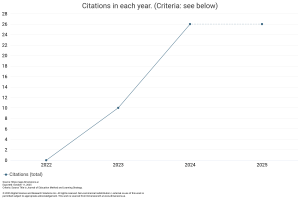Development of E-Module Media on Learning to Make Body Proportion Images in Class X Fashion Design SMK Negeri 1 Buduran
DOI:
https://doi.org/10.59653/jemls.v2i02.801Keywords:
Learning Media, Eligibility Level, Keywords: PKN SD, PKN learning outcomes, problem based learning model, Body Proportion Image MakingAbstract
Media Learning is an educational instrument to support the learning process. The purpose of this study is to determine the process of developing E-Module media, the feasibility level of E-Module media, and student learning outcomes after applying E-Module media to learning to make body proportion images. This research uses Research and Development (R&D) research with the ADDIE development model. The data collection technique used feasibility validation with 2 media validation experts and 2 material validations as well as tests by students in class X fashion with a total of 36 students. The data analysis technique used is an assessment of media feasibility and student learning outcomes. The results of the E-Module media feasibility level research on learning to make body proportion images were declared very feasible with a score of 4.25. Student learning outcomes in learning to make body proportion drawings are shown with classical percentages of 97% complete and 3% incomplete. E-Module learning media with very feasible categories can improve student learning outcomes in learning to make body proportion images in class X of SMK Negeri 1 Buduran.
Downloads
References
Alp Christ, A., Capon-Sieber, V., Grob, U., & Praetorius, A. K. (2022). Learning processes and their mediating role between teaching quality and student achievement: A systematic review. In Studies in Educational Evaluation (Vol. 75). https://doi.org/10.1016/j.stueduc.2022.101209
Arsyad, Azhar. 2013. Media Pembelajaran. Jakarta: Raja Grafindo Persada.
Dantas, L. A., & Cunha, A. (2020). An integrative debate on learning styles and the learning process. Social Sciences and Humanities Open, 2(1). https://doi.org/10.1016/j.ssaho.2020.100017
Depdiknas. 2003. Undang-undang RI No.20 tahun 2003. Tentang sistem pendidikan nasional
Direktorat Pembinaan SMA. 2017. Panduan Praktis Penyusunan E-Modul. Jakarta: Direktorat Jenderal Manajemen Pendidikan Dasar dan Menengah
Djamarah, S. B., & Zain, A. 2010. Strategi Pembelajaran. Jakarta: Rineka Cipta
Hamid, M. A., Yuliawati, L., & Aribowo, D. (2020). Feasibility of electromechanical basic work e-module as a new learning media for vocational students. Journal of Education and Learning (EduLearn), 14(2). https://doi.org/10.11591/edulearn.v14i2.15923
Irawati. 2020. “Pengembangan Media Pembelajran Biologi Berbasis Modul Elektronik (E-Modul) pada Materi Struktur dan Fungsi Tumbuhan Kelas VIII SMP/MTS”. Prosiding Seminar Nasional Pendidikan Biologi 2020
Iriani, T., Elvarita, A., & Handoyo, S. S. (2020). “Peningkatan Materi Pelajaran Mekanika Tanah”. JpenSil. Vol 9(1): pp 1–7.
Knoop-van Campen, C. A. N., Segers, E., & Verhoeven, L. (2020). Effects of audio support on multimedia learning processes and outcomes in students with dyslexia. Computers and Education, 150. https://doi.org/10.1016/j.compedu.2020.103858
Kuswidyaningrum. 2022. “Pengembangan E-Modul Penataan Sanggul Gala SMK Program Keahlian Tata Kecantikan”. Jurnal Penelitian Pendidikan Indonesia (JPPI).Vol. 7(1): pp 2477-3921
Logan, R. M., Johnson, C. E., & Worsham, J. W. (2021). Development of an e-learning module to facilitate student learning and outcomes. Teaching and Learning in Nursing, 16(2). https://doi.org/10.1016/j.teln.2020.10.007
Long, Deanna dan Szabo, Susan. (2016). “E-Readers and the Effects on Students Reading Motivation, Attitude and Comprehension During Guided Reading.” Journal Cogent Education Volume 3, 2016 – Issue 1.
Mardapi, Djemari. 2015. Pengukuran, Penilaian, dan Evaluasi Pendidikan. Yogyakarta: Nuha Litera
Nur, dkk. 2021. Pengembangan Media Pembelajaran Modul Elektronik (E-Modul) Prosiding Seminar Nasional Pendidikan Biologi 2021
Palangda, L., Naharia, O., Sumual, S. D. M., Ebe, L. S., & Mandey, L. (2023). Analysis of Barriers to Implementation of the Independent Curriculum Study the Merdeka Campus in the Department Economic Education Manado State University. International Journal of Multidisciplinary Approach Research and Science, 1(02), 125–132. https://doi.org/10.59653/ijmars.v1i02.64
Palwati, T. J., Puswiartika, D., & Misnah, M. (2023). Influence of Visual Media and Interest in Learning on Student Learning Outcomes in Social Sciences Subjects at SMP Negeri 1 Bunta. Journal of Education Method and Learning Strategy, 2(01), 28–43. https://doi.org/10.59653/jemls.v2i01.310
Quraishi, T., Hakimi, M., Hakimi, N., Khani, A. M., Zahid, N., & Mohammadi, F. G. (2024). Exploring Emerging Technologies in Online Medical Education: A Survey of Women’s Online University. Journal of Education Method and Learning Strategy, 2(02), 217–233. https://doi.org/10.59653/jemls.v2i02.650
Sony Junaedi. 2021 “Aplikasi Canva sebagai Media Pembelajaran Daring untuk Meningkatkan Kemampuan Kreatifitas Mahasiswa pada Mata kuliah English for Information Communication and Technology” Bangun Rekaprima Vol.07/2/10/2021
Tegeh, I Made., dkk. 2014. Pengembangan Bahan Ajar Metode Penelitian Pendidikan Dengan Model Addie. Yogyakarta: Universitas Pendidikan Ganesha Press
Teni. 2018. Pengembangan Media Pembelajaran untuk Meningkatkan Hasil Belajar Siswa. Misykat: Jurnal Ilmu-ilmu Al-Quran, Hadist, Syariah dan Tarbiyah. Volume 03, Nomor 01, Juni 2018
Vargas, I. M., Cabrera, C. I. G., Cortez, C. A. A., Apaza, I. M. A., & Reátegui, M. D. (2022). The canva platform and meaningful learning in regular basic education. International Journal of Health Sciences. https://doi.org/10.53730/ijhs.v6ns7.11213
Yudi, Sugianti. 2020. Penelitian Pengembangan Model ADDI dan R2D2: Teori & Praktek. Lembaga academic & Research Institute, 2020.
Downloads
Published
How to Cite
Issue
Section
License
Copyright (c) 2024 Marsha Belinda Adani, Imami Arum Tri Rahayu, Deny Arifiana, Peppy Mayasari

This work is licensed under a Creative Commons Attribution-ShareAlike 4.0 International License.
Authors who publish with this journal agree to the following terms:
- Authors retain copyright and grant the journal right of first publication with the work simultaneously licensed under a Creative Commons Attribution-ShareAlike that allows others to share the work with an acknowledgement of the work's authorship and initial publication in this journal.
- Authors are able to enter into separate, additional contractual arrangements for the non-exclusive distribution of the journal's published version of the work (e.g., post it to an institutional repository or publish it in a book), with an acknowledgement of its initial publication in this journal.
- Authors are permitted and encouraged to post their work online (e.g., in institutional repositories or on their website) prior to and during the submission process, as it can lead to productive exchanges, as well as earlier and greater citation of published work (See The Effect of Open Access).
























